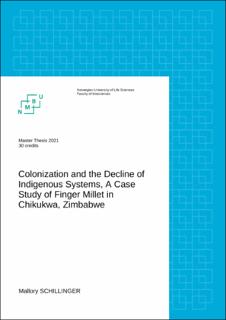| dc.contributor.advisor | Ann Marie Nicolaysen | |
| dc.contributor.advisor | Alexander Wezel | |
| dc.contributor.author | Schillinger, Mallory Ann | |
| dc.date.accessioned | 2023-08-09T16:27:10Z | |
| dc.date.available | 2023-08-09T16:27:10Z | |
| dc.date.issued | 2023 | |
| dc.identifier | no.nmbu:wiseflow:6904105:55453760 | |
| dc.identifier.uri | https://hdl.handle.net/11250/3083236 | |
| dc.description.abstract | Indigenous food systems play a critical role as we battle with global climate change. These still exiting smallholder farmers sustain much or the world biodiversity and ancient land-based wisdom. Although these food systems have stood the test of time, there is little research on what caused their demise as well as what held them together before they were dismantled. This research sought to capture the indigenous agroecological wisdom that still exist and the understanding of the loss surrounding finger millet of the Shona people by conducting a participatory case study on the Chikukwa community in the Eastern Highlands of Zimbabwe. This research showed that practices surrounding finger millet played a key role in the social cohesion, food security, physical wellbeing, and spirituality that enabled resiliency that held this community together before the introduction of colonization and Christianity, which alongside Zimbabwe’s new country politics and intergeneration dynamic were key causes to the demise of finger millet. Concluding that the role of indigenous food systems was much more than agricultural but play a vital role in the overall cultural. Therefore, as the western world continues to operate in the space of develop | |
| dc.description.abstract | | |
| dc.language | eng | |
| dc.publisher | Norwegian University of Life Sciences | |
| dc.title | Colonization and the Decline of Indigenous Food Systems, A Case Study of Finger Millet in Chikuwa, Zimbabwe | |
| dc.type | Master thesis | |
